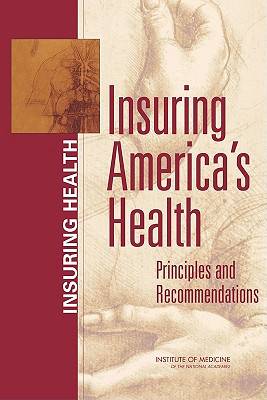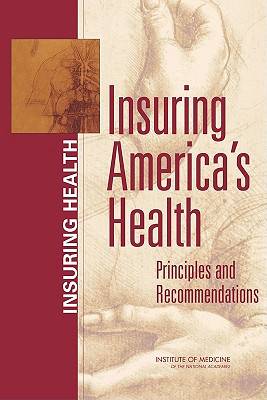
- Retrait gratuit dans votre magasin Club
- 7.000.000 titres dans notre catalogue
- Payer en toute sécurité
- Toujours un magasin près de chez vous
- Retrait gratuit dans votre magasin Club
- 7.000.0000 titres dans notre catalogue
- Payer en toute sécurité
- Toujours un magasin près de chez vous
Insuring America's Health
Principles and Recommendations
Institute of Medicine, Board on Health Care Services, Committee on the Consequences of UninsuranceDescription
According to the Census Bureau, in 2003 more than 43 million Americans lacked health insurance. Being uninsured is associated with a range of adverse health, social, and economic consequences for individuals and their families, for the health care systems in their communities, and for the nation as a whole. This report is the sixth and final report in a series by the Committee on the Consequences of Uninsurance, intended to synthesize what is known about these consequences and communicate the extent and urgency of the issue to the public. Insuring America's Health recommends principles related to universality, continuity of coverage, affordability to individuals and society, and quality of care to guide health insurance reform. These principles are based on the evidence reviewed in the committee's previous five reports and on new analyses of past and present federal, state, and local efforts to reduce uninsurance. The report also demonstrates how those principles can be used to assess policy options. The committee does not recommend a specific coverage strategy. Rather, it shows how various approaches could extend coverage and achieve certain of the committee's principles.
Spécifications
Parties prenantes
- Auteur(s) :
- Editeur:
Contenu
- Nombre de pages :
- 224
- Langue:
- Anglais
Caractéristiques
- EAN:
- 9780309091053
- Date de parution :
- 14-02-04
- Format:
- Livre broché
- Format numérique:
- Trade paperback (VS)
- Dimensions :
- 152 mm x 228 mm
- Poids :
- 367 g

Les avis
Nous publions uniquement les avis qui respectent les conditions requises. Consultez nos conditions pour les avis.






